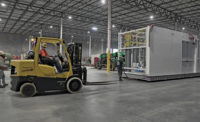More than 100 people were arrested for looting and disorderly conduct in Chicago late on Aug. 9 and early on Aug. 10 after looting in the city's Magnificent Mile and other shopping districts. Mayor Lori Lightfoot said that transportation in and out of the downtown loop will be restricted from 8PM to 6AM and that “these measures will be in place until we know our city will be safe.”
The city will use more than 100 “infrastructure assets” that are to be strategically placed to protect commercial corridors and critical businesses “such as grocery stores and pharmacies,” said the statement from Mary May, a spokeswoman for the emergency management and communication office.
Access to downtown “will be temporarily restricted” beginning at 8 p.m. Monday until 6 a.m. Tuesday. May stressed that the restricted access “is not a curfew. All residents, essential workers and employees whose businesses are located downtown will have access at all times.”
The emergency management office released a statement that said it will enforce the restricted access to the Chicago Loop and downtown area by using assets such as large city-owned trucks and other vehicles that can serve as barriers, and by raising bridges to downtown neighborhood. Lake Shore Drive, a major truck traffic highway, will close between Fullerton and Interstate 55.
Lightfoot and Chicago Police Superintendent David Brown called on local prosecutors and judges to prosecute looters and create consequences for the caravan of cars that broke into stores in Chicago's Michigan Avenue shopping district.
"I call on our states attorney and prosecutors to step up and do their part," Lightfoot said. "Judges who are holding these cases, you need to step up."
The Chicago Dept. of Buildings does not track damage to buildings in such incidents. The Magnificent Mile Association, a trade group for Michigan Avenue business owners, said that while most merchants were still cleaning up their stores, damages would likely total in the millions of dollars.
While most building construction sites in the city's central business district do not have night shifts, many of the highway and street projects do. The $800-million Jane Byrne Interchange project has had night work in many areas of the central business district since June.
"As long as they have identification or work ID they should be fine," May said of workers needing access via checkpoints such as the LaSalle Street bridge. "As long as people live or work in the area it's fine. Restrictions end at 6AM."
She said the restrictions will stay in effect until further notice. The Illinois Department of Transportation said in a statement it is not mandating a shutdown or change in working hours on the IDOT system at this time. It also said some contractors have voluntarily chosen to postpone work activities.






Post a comment to this article
Report Abusive Comment